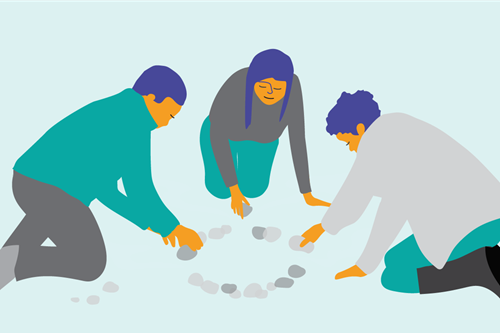Overview
This series of self-paced learning activities introduces four core foundations that support high-performing, person-centred health systems: rethinking patient safety, health equity, engagement capable environments and cultural safety. Together, they also align with the Quintuple Aim, a framework that guides health systems to improve population health, enhance care experiences, reduce costs, support provider well-being and advance health equity.
These foundations were selected based on input from organizations across the country that identified them as areas where deeper learning and action are most needed. They are designed to lay the groundwork for meaningful progress by offering a low-touch, accessible approach that meets you where you are in your learning journey. The foundations include a mix of individual and team-based activities to support meaningful learning and real-world application. Whether you're engaging with the material on your own or with your team, you'll find opportunities to reflect, connect, and act toward safer care that is also culturally safer, more equitable and inclusive.
Learning objectives
In this introduction, we focus on four core foundations of healthcare excellence:
Rethinking patient safety
Learn how to think and act differently about safety in care beyond the absence of harm.
Health equity
Reflect on the systems and biases that shape care experiences, and how we can create more equitable care.
Engagement-capable environments
Discover how engagement-capable environments support partnerships and centres lived experiences in the work of improvement
Cultural safety
Consider how power dynamics, racism and colonial systems affect care, and what it takes to create culturally safe experiences.
Why these foundations matter and how they are connected
Everyone involved in care, whether delivering it or receiving it, has a role to play in shaping safer, more equitable and more person-centred health systems. Each of these foundations is important on its own, but their real power lies in how they connect and support one another in practice. Meaningful engagement with patients, caregivers and communities helps us understand what safety and quality look like through their eyes. These lived experiences can surface harms and gaps that traditional indicators often miss. This is the heart of rethinking patient safety: understanding that safety is not just the absence of harm, but something we create together, where everyone has a role.
As we listen to lived experiences, we also begin to see how societal norms and systemic structures can create advantage for some and barriers for others. Racism, discrimination and bias contribute to inequities in care and outcomes. This is particularly true for First Nations, Inuit and Métis patients, families and communities. These experiences lead to inequities in access, quality and safety of care, with many experiencing significant healthcare harm. Cultural safety is an outcome determined by the person receiving care. It depends on respectful engagement, recognition of power imbalances and a commitment to addressing racism within systems and structures. Only patients, families and caregivers can determine whether their care has been culturally safe.
Equitable care means responding to each person’s needs, regardless of their background, identity or circumstances. Creating truly equitable and safe care requires environments where engagement is not occasional or symbolic but embedded in how decisions are made and services that meet the needs of those being served.
As you move through the activities, we invite you to reflect on how these foundations show up in your work, how they interact and where there are opportunities to strengthen them. This series of Foundations of Healthcare Excellence is a starting point for that journey.
Before you begin
To help guide your reflection and support your learning, you might keep the following in mind:
- Take time to reflect on how you are feeling as some learning can be difficult. If you're reflecting as a team, be kind to yourself and others as you consider your own well-being as well as others. Be prepared with resources that will support you and others.
- If reflecting as a team, create a welcoming environment that helps promote psychological safety and encourages everyone to share and learn.
- Reflect on what you are hearing and share what you are learning with others.
- Engagement may take time. Find a variety of opportunities and ways to promote engagement.
- Keep the conversation going. Do not stop just because you came to the end of the learning activities. Find ways to build conversations, inquiry, and curiosity in your daily work.
Individual learning
Watch and reflect
Duration: 5 minutes
In this short video, a caregiver named Lew shares the story of two important women in his life. Both faced significant health challenges, yet their care experiences unfolded in very different ways.
As you move through the Foundations of Healthcare Excellence, we invite you to reflect on Lew’s story and consider how safety, equity, engagement and cultural safety are experienced by those receiving care. These reflections remind us that change begins with listening and learning. Use the reflection questions below to guide your thinking.
Reflection questions:
- What influenced the differences in care experiences described in the story?
- What does this reveal about how safety, equity, engagement and cultural safety show up in real care journeys?
- How do personal identity, lived experience or geography influence how care is delivered and received?
- What responsibilities do we share in helping close these gaps, as individuals, teams or organizations?
Connecting the pieces
Throughout your learning journey, we invite you to:
- Reflect on how personal beliefs and behaviours influence safety, equity, engagement and cultural safety, and how you may interact with others
- Consider how broader health systems may impact your beliefs and behaviours
- Deepen your understanding of how these foundations are interconnected
- Identify practical actions to support safer, more equitable and inclusive care
Team reflection activity
To begin this process, take time to reflect on the video and discuss the following questions together as a team:
- How have elements of engagement, equity, cultural safety and patient safety shown up in the experiences shared with you in this video?
- How do you see them as interconnected? How have they impacted the quality and safety of care?
- What steps might you take to improve these experiences by enabling engagement capabilities, creating culturally safe and equitable care, and promoting safer care for all?
Explore the foundations
The four below each explore one of the core foundations of healthcare excellence. You’re welcome to explore them in any order, based on your interests or the needs of your team. There’s no required sequence, start where it makes the most sense for you.
Each includes a mix of video content, individual readings, reflection questions, and activities for individuals or teams. You’ll be invited to:
- Understand the core concepts of each foundation
- Reflect on their interconnections
- Identify practical steps for improving care through your daily work
- Explore real experiences from people receiving and delivering care
Select from the foundations below to get started:

Rethinking Patient Safety Foundation
Learn how to think and act differently about safety in care beyond the absence of harm.
Estimated time for completion: ~1.5 to 2 hours

Cultural Safety Foundation
Understand how racism experienced by First Nations, Inuit and Métis affects safety and how we can take action to improve cultural safety in care.
Estimated time for completion: ~2 to 2.5 hours

Engagement-Capable Environments Foundation
Discover how engagement-capable environments support partnerships and centres lived experiences in the work of improvement
Estimated time for completion: ~1.5 hours

Health Equity Foundation
Reflect on the systems and biases that shape care experiences, and how we can create more equitable care.
Estimated time for completion: ~1.5 to 2 hours
